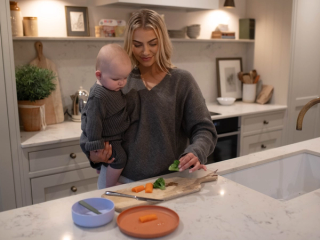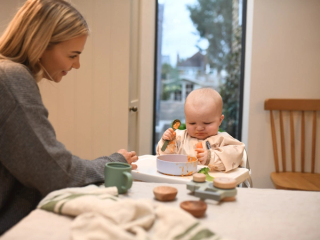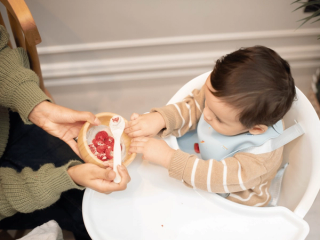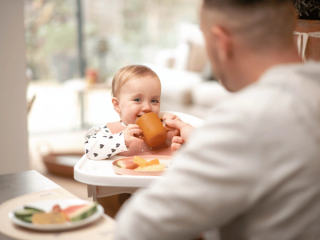
- Home
- Advice Hub
- Baby
- Weaning
- The Essential Nutrients A Baby Needs
The essential nutrients a baby needs
By following a few simple nutrition principles, you can be sure you’re giving your baby a healthy nutritious diet and helping them enjoy their food.
Being a parent can come with its fair share of worries or confusions, especially in the early months of a baby’s life. When you start introducing solids, it can feel like a bit of a minefield on what your baby really needs.
To reassure you a little, you don’t need to overcomplicate nutrition. Try to offer a balanced diet, including foods from all food groups and vary the meals you offer across the week.
There are several important nutrients to ensure that your baby gets in their diet to ensure they are growing and thriving.
Iron
Iron is a vital mineral because it has several important jobs, the most important of which is to carry oxygen around the body in the blood. Iron is also of particular importance if your baby was born prematurely or for Mums who were low in iron whilst pregnant.
By around six months of age, a baby’s iron stores that were built up during pregnancy are usually very low or completely used up. Breast milk and formula do not provide enough iron to meet your baby’s daily requirements, so it is essential your baby eats enough iron rich foods to ensure they are getting enough each day.
So, how much does your baby need each day? (don’t worry if the numbers don’t mean much at the moment!)
- Babies aged 4-6 months need 4.3mg of iron daily*
- Babies aged 7-12 months need 7.8mg of iron daily*
The easiest way to achieve these amounts, without making it complicated, is to always include an iron source with every meal. You can choose naturally iron rich foods such as red meat, dark white meat, beans, pulses, eggs and dark green leafy veg. Or, alternatively, you can use products that have iron added to them such as our range of dried porridges.
Adding a food that contains vitamin C such as fruit or vegetables will help the iron to be absorbed.
Below is an example meal plan to get you started. We’ve listed the iron in the major iron sources in each meal; but your baby will get a little from some of the other foods too.
Milk feeds: Babies get iron from their milk feeds, but past six months it is not enough to meet their full needs. All babies drink different amounts of milk, but as an example, if your baby is drinking 600ml of formula they will be getting ~3mg of iron a day. With breast feeding, it’s impossible to tell exactly how much milk has been taken if feeding direct from the breast. If you are breastfeeding, you should continue to feed on demand as well as offering iron rich foods to your baby at mealtimes.
- Breakfast: HiPP Organic creamy porridge (2.6mg) served with ½ a banana
- Lunch: 1 medium egg omelette (1mg) with grated cheese & chopped vegetables served with toast fingers spread with hummus (0.3mg)
- Dinner: Beef Bolognese with 40g mince (0.8mg) served with pasta and cheese
- Milk feeds: ~600ml provides around 3mg iron each day.
Total iron from the above meal plan is 7.7mg which is around the amount required for a 7-12 month old baby. So you can see, it can be relatively simple to ensure your baby gets enough iron if you include an iron rich food in most meals.
Calcium
Calcium is important for the development of bones; and whilst it’s easy to meet your baby’s needs when they are still breast or formula feeding it’s always good to think ahead to when those feeds start to reduce. We get calcium from lots of different foods, but the richest source and often the go to for little ones are dairy foods; milk, yoghurt & cheese. If you aim for 2-3 portions a day (additionally to their milk feeds) you’ll be getting into good habits for when they are older and milk feeds have dropped.
Tip: In order for your body to absorb calcium, it needs vitamin D, so make sure you’re giving your baby vitamin D drops (and taking them yourself) if you are breastfeeding or giving less than 500ml of formula.
Ways to try:
- Our mango & banana topped with yoghurt jar
- Our range of porridges
- Using plain yoghurt with a savoury dish such as curry, chilli or dahl.
- Add a large spoonful of cream cheese to mashed potatoes, or mashed vegetables such as carrot or swede.
Omega 3
Omega-3 is a type of healthy fat that’s essential for the development of your baby’s eyes†. Including it in their diet regularly can help support their development during these early years.
You can find Omega-3 in oily fish such as salmon, trout, sardines, and mackerel. A suitable serving for a baby is roughly the size of their palm. Aim to offer 1–2 servings each week—but no more than that—since oily fish can contain low levels of heavy metals. Still, the nutritional benefits of these fish generally outweigh any small potential risks when eaten in moderation.
Ways to try:
- Blend some sardines with a can of chopped tomatoes, oregano and garlic powder for a quick pasta sauce.
- Add half a teaspoon of chia seeds to yoghurt
- Make scrambled egg with omega enriched eggs
Multivitamins
Between 6 months and 5 years NHS recommends that you start giving a multivitamin containing Vitamins A, C & D. If your baby is having over 500ml formula a day you don’t need to give them as the milk has vitamins and minerals added.
As your baby grows and starts exploring solid foods, it’s natural to want everything to be perfect, but don’t worry, it doesn’t need to be complicated. Focus on including key nutrients like iron, calcium, and omega-3 fats in meals to support healthy growth and development. A daily multivitamin can also help fill any small nutritional gaps. Most importantly, aim to offer a variety of foods from all food groups, try different textures and flavours, and enjoy the process of introducing your baby to their first foods.
* Ref. Department of Health Dietary Reference Values, 1991
†DHA intake contributes to the normal visual development of infants up to 12 months of age (beneficial effect is obtained with a daily intake of 100 mg of DHA).
Advice & tips

Want to read more? Join the HiPP BabyClub for full access to this article.
As a BabyClub member, you'll get access to a range of exclusive benefits, including:
Monthly competitions
Discounts from our Partners
Expert advice tailored to your little one's age
Weaning recipes
HiPP shop discounts*
*10% off HiPP's online shop does not apply to our First Infant, Anti-Reflux or Comfort Formula Milk.
Important notice: Breastfeeding is best. Follow on milk should only be used as part of a mixed diet from 6 months. Talk to a healthcare professional.
















